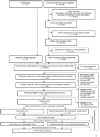Reach out to ENhancE Wellness in Older Cancer Survivors (RENEW): design, methods and recruitment challenges of a home-based exercise and diet intervention to improve physical function among long-term survivors of breast, prostate, and colorectal cancer
- PMID: 19117329
- PMCID: PMC2748788
- DOI: 10.1002/pon.1491
Reach out to ENhancE Wellness in Older Cancer Survivors (RENEW): design, methods and recruitment challenges of a home-based exercise and diet intervention to improve physical function among long-term survivors of breast, prostate, and colorectal cancer
Abstract
Objective: Cure rates for cancer are increasing, especially for breast, prostate, and colorectal cancer. Despite positive trends in survivorship, a cancer diagnosis can trigger accelerated functional decline that can threaten independence, reduce quality-of-life and increase healthcare costs, especially among the elderly who comprise the majority of survivors. Lifestyle interventions may hold promise in reorienting functional decline in older cancer survivors, but few studies have been conducted.
Methods: We describe the design and methods of a randomized controlled trial, RENEW (Reach out to ENhancE Wellness), that tests whether a home-based multi-behavior intervention focused on exercise, and including a low saturated fat, plant-based diet, would improve physical functioning among 641 older, long-term (>or=5 years post-diagnosis) survivors of breast, prostate, or colorectal cancer. Challenges to recruitment are examined.
Results: Twenty thousand and fifteen cases were approached, and screened using a two-step screening process to assure eligibility. This population of long-term, elderly cancer survivors had lower rates of response (approximately 11%) and higher rates of ineligibility (approximately 70%) than our previous intervention studies conducted on adults with newly diagnosed cancer. Significantly higher response rates were noted among survivors who were White, younger, and more proximal to diagnosis and breast cancer survivors (p-values<0.001).
Conclusion: Older cancer survivors represent a vulnerable population for whom lifestyle interventions may hold promise. RENEW may provide guidance in allocating limited resources in order to maximize recruitment efforts aimed at this needy, but hard-to-reach population.
(c) 2008 John Wiley & Sons, Ltd.
Conflict of interest statement
Authors’ Disclosures of Potential Conflicts of Interest
The authors indicated no potential conflicts of interest.
Figures
References
-
- American Cancer Society. Cancer Facts and Figures-2008. American Cancer Society. 2008. http://www.cancer.org/docroot/STT/stt_0.asp [cited 9 June 2008].
-
- National Cancer Institute Office of Cancer Survivorship. Cancer Control and Population Sciences:Research Findings. http://dccps.nci.nih.gov/ocs/prevalence/index.html [cited 9 June 2008].
-
- Yancik R, Riles LA Aging and Cancer in America. Demographic and epidemiologic percepectives. Hematol Oncol Clinics North Am. 2000;14(1):17–23. - PubMed
-
- Aziz NM. Cancer survivorship research: challenge and opportunity. J Nutrition. 2002;132(11S):3494S–3503S. - PubMed
-
- Meadows AT, Varricchio C, Crosson K, Harlan L, McCormick P, Nealon E, Smith M, Ungerleider R. Research issues in cancer survivorship. Cancer Epidemiol Biomarkers Prev. 1998;7(12):1145–1151. - PubMed



